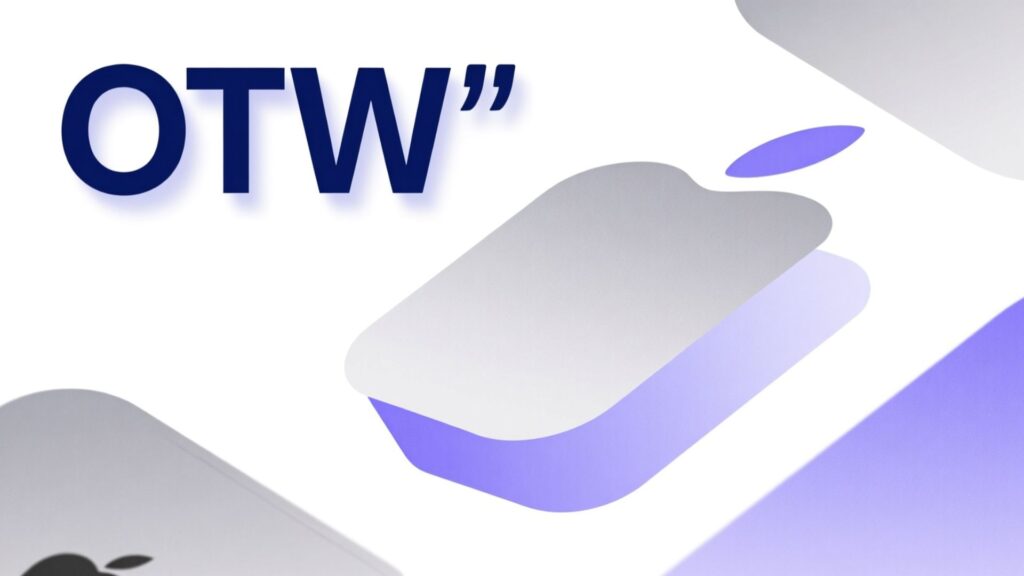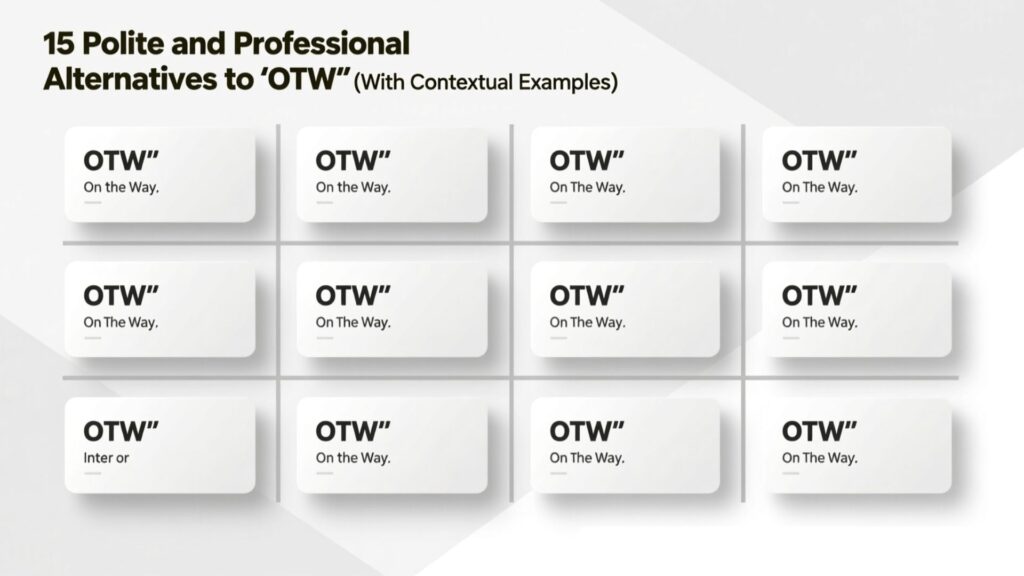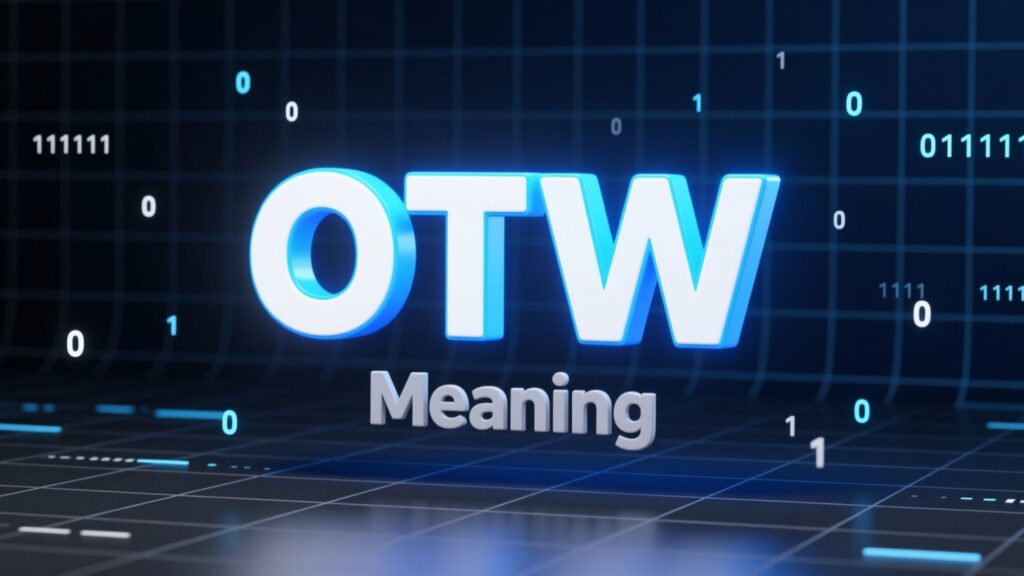Introduction: Why “OTW” Still Matters in 2025

Texting has become second nature and with it, shorthand and acronyms rule. One of those is the phrase “OTW”. You’ve probably typed it, seen it, or gotten it pinged at you while waiting for someone to arrive. But here’s the thing: while it may feel casual and efficient among friends, using “OTW” in a professional or semi-formal setting can create unintended impressions.
In this post you’ll discover what does OTW mean in text, why context matters, and which alternatives help you sound clearer, more polished, and more respectful. By the end you’ll have a toolkit of phrases you can use instead of “OTW” or decide when “OTW” actually fits fine.
What Does “OTW” Mean in Text?
At its simplest, OTW means “On The Way.”
In everyday texting, “OTW” is a quick way to let someone know you’re en route. For example:
“OTW, see you in five.”
¤ It signals movement, arrival, imminence.
¤ It conveys that you’ve started or are about to start heading somewhere.
In digital shorthand often used with friends, chats, informal social media, this is totally fine. But when you ask what does OTW mean in texting within more formal settings, things change. The plain “OTW” lacks nuance about tone, timing, context.
A few extras:
- Sometimes “OTW” (less commonly) is also used to mean “Off To Work.”
- Slang dictionaries also list “OTW” under texting-acronyms category.
So whenever you see “OTW,” ask: What’s the setting? Who’s sending it? What impression does it give?
The Problem With Using “OTW” Everywhere
“OTW” may be convenient but it can carry unintended undertones or fail to express what you mean. Here’s why you might think twice before hitting “Send”:
- Too casual or abrupt: In work or client settings, “OTW” may seem lazy or shorthand-heavy.
- Lacks clarity: It doesn’t specify when you’ll arrive, unless additional context is provided.
- Tone matters: A terse “OTW” might feel indifferent, whereas a fuller phrase shows effort and respect.
- Mis-impression risk: If your recipient expects formality, brevity may read as unprofessional.
- Generational/context gap: Older colleagues or more formal relationships may view acronyms with suspicion.
In short: it’s not that “OTW” is wrong it’s that use without context can feel off.
When You Should Avoid “OTW” in Texts
Knowing when not to use “OTW” is as important as knowing the meaning. Below is a table to help you judge.
| Situation | Using “OTW”? | Why Avoid It | Better Alternative |
|---|---|---|---|
| Texting a friend you’ve met before | ✅ Acceptable | Informal relationship | “OTW!” |
| Messaging your manager/team lead about arrival | ❌ Avoid | Too casual, lacks clarity | “I’m on my way now and will arrive in approx. 10 min.” |
| Updating a client or vendor on your arrival | ❌ Avoid | Professional tone expected | “Heading over shortly; see you at 3 PM.” |
| Sending a message at the start of a new work relationship | ❌ Avoid | First impression matters | “I’m en route and should reach you in about 15 mins.” |
Key rule of thumb: If the relationship demands formality, clarity, or professionalism, skip the shorthand.
Choosing the Right Alternative: Match Tone and Setting
Choosing smart phrasing takes a simple framework. Here’s a Tone Fit Framework (TFF) you can apply:
Step 1 – Identify the Relationship:
- Friend or peer?
- Manager or boss?
- Client or external partner?
Step 2 – Evaluate Timing & Urgency:
- Is the arrival imminent (within minutes)?
- Is it routine or expected?
- Is there a need for extra detail (ETA, traffic status)?
Step 3 – Adjust Tone Accordingly:
- For informal: keep it light, friendly.
- For neutral: clear, polite, no slang.
- For formal/professional: full phrase, punctuation, maybe gratitude.
Tone Guide – Casual vs. Neutral vs. Formal
| Tone | Sample Phrase | Notes |
|---|---|---|
| Casual | “On my way, see you soon!” | Friendly among equals |
| Neutral | “Heading over shortly.” | Work-chat among peers |
| Formal | “I’m en route now. Thank you for your patience.” | Client/manager communication |
Use this guide each time you’re asking yourself: “Does my phrasing fit the relationship and setting?”
15 Polite and Professional Alternatives to “OTW” (With Contextual Examples)

Here are upgraded phrases you can use instead of “OTW”, with explanations and contexts:
| Alternative Phrase | Best Used For | Tone |
|---|---|---|
| “I’m on my way now.” | Manager, client, team meeting | Polite |
| “Heading over shortly.” | Informal work chat, peer group | Neutral |
| “I’ll be there soon.” | General arrival update | Friendly |
| “Just left, see you in a bit.” | Casual but still clear | Friendly |
| “Making my way there.” | Professional yet relaxed | Polite |
| “En route now.” | Formal situations | Formal |
| “Currently on the move.” | Logistics / delivery update | Neutral-formal |
| “I’m driving there now.” | When travel involved | Transparent |
| “On my way, thanks for your patience.” | Professional courtesy | Formal |
| “Almost there!” | Team chat / informal arrival | Friendly |
| “Approaching your location.” | Very professional or technical setting | Formal |
| “In transit.” | Delivery, logistics, formal communication | Formal |
| “I’m heading out now.” | Starting travel | Neutral |
| “Just leaving, see you soon.” | Pre-meeting, casual-work setting | Neutral |
| “Be there shortly, traffic’s light.” | Adds context, professional but human | Polite |
Examples in sentences:
- “I’m on my way now; I should be there in about 7 minutes.”
- “Currently on the move will update if anything changes.”
- “I’m driving there now; thanks for waiting.”
These alternatives help you express the same basic idea as “OTW” but with nuance and professionalism depending on the setting.
Nuance of Tone: Why Word Choice Shapes Perception
Small phrase shifts influence how others feel about your message. Consider:
- “OTW” vs. “I’m on my way now.” The second sounds deliberate.
- “En route” sounds efficient but may feel cold if you drop punctuation or greeting.
- “Be there shortly, traffic’s light” adds context, transparency, human-touch.
Why tone matters:
- It conveys respect.
- It shows you’ve considered the recipient.
- It helps build credibility and trust.
Mini-case study:
A consultant texting the client, “OTW”, received replies like “Great” but no engagement. Later the same consultant sent: “Heading your way shortly; thanks for your patience.” The client responded with “Thank you for letting me know” and meeting fluidly proceeded. The extra wording didn’t add much time it added tone.
In professional settings tone speaks volumes. Clarity + courtesy = strong impression.
Professional Communication: Avoiding Slang and Abbreviations
Slang acronyms like “OTW”, “BRB”, “FYI” have their place in casual messaging. But in work-related texts less is more. Some considerations:
- Clarity beats speed: Your audience should instantly understand your meaning.
- Avoid mis-interpretation: Not everyone knows or likes acronyms.
- Mind generational/context differences: What’s casual to one may feel disrespectful to another.
- Use digital-communication tools: Many writing assistants now flag informal slang for professional use.
Common pitfalls to steer clear of:
- Sending “OTW” to your manager without context.
- Using “Coming” with no indication of when.
- Dropping punctuation or greeting in “En route” makes it read robotic.
By choosing full phrases thoughtfully, you raise your communication from “texting” to “professional messaging.”
Tone Mistakes to Avoid (and Why They Matter)
Here’s a quick table of tone mistakes, why they irritate, and better alternatives:
| Mistake | Why It’s Problematic | Better Option |
|---|---|---|
| “OTW” to your manager | Too casual, lacks clarity | “I’m on my way now and should arrive shortly.” |
| “Coming” with no context | Vague when, where? | “Just leaving my office; see you in approx. 10 min.” |
| “En route” with no punctuation | Feels terse and cold | “En route now. Thank you for your patience.” |
| Over-using exclamation marks | Overly casual, may undermine professionalism | Use one exclamation when appropriate, or none. |
Mistakes like these don’t ruin your message—they just dilute it. Choose words that carry meaning and tone.
Why Replacing “OTW” Elevates Your Communication
Opting for a fuller phrase instead of “OTW” offers clear benefits:
- Professionalism: You present yourself as intentional, not off-the-cuff.
- Clarity: The recipient knows what you mean and when you’ll arrive.
- Trust/Respect: You signal you value their time and context.
- Better relationships: In business settings, small details like phrasing add up in impressions.
Quote:
“Good communication is the bridge between confusion and clarity.”
Nat Turner
By refining how you say things like “on the way,” you strengthen that bridge.
Quick Reference Guide: Text Etiquette 2025
Here’s a handy reference you can bookmark for your own messaging:
| Situation | Use “OTW”? | Better Phrase | Tone |
|---|---|---|---|
| Hanging out with a friend | ✅ Yes | “OTW!” | Casual |
| Team-chat with coworkers | ⚠️ Maybe | “Heading over shortly.” | Neutral |
| Manager/client update | ❌ No | “I’m on my way now; thanks for waiting.” | Professional |
| First meeting with a new client | ❌ No | “I’m approaching your location; see you in ~10 min.” | Very formal |
When in doubt: choose the phrase that shows awareness of your audience and setting.
Summary: Choosing the Right Phrase Every Time
Let’s wrap up what we’ve covered:
- You now know what does OTW mean in text: shorthand for “on the way”.
- You understand why using “OTW” everywhere can cause tone issues.
- You have a framework (Tone Fit Framework) to match phrasing to context.
- You gathered 15 alternative phrases with examples and tones.
- You learned about tone mistakes to avoid and how better phrasing improves your communication.
The takeaway: being a more mindful messenger matters.
Final Thoughts
Texting is quick, but your words still carry weight. Choosing the right phrase isn’t about being overly formal it’s about being clear, courteous, and appropriate to your audience. So next time you’re tempted to hit “OTW,” stop and ask yourself: “Does this phrase match who I’m talking to and the setting?” If yes, great. If no, pick one of the alternatives above. A small shift in words makes a big difference in how you come across.
Bugti is the founder of Quoethint.com, a hub for English language tips, writing advice, and grammar guidance. With years of experience in English studies and a passion for clear communication, Bugti created this platform to make grammar and writing easy to understand for everyone.
